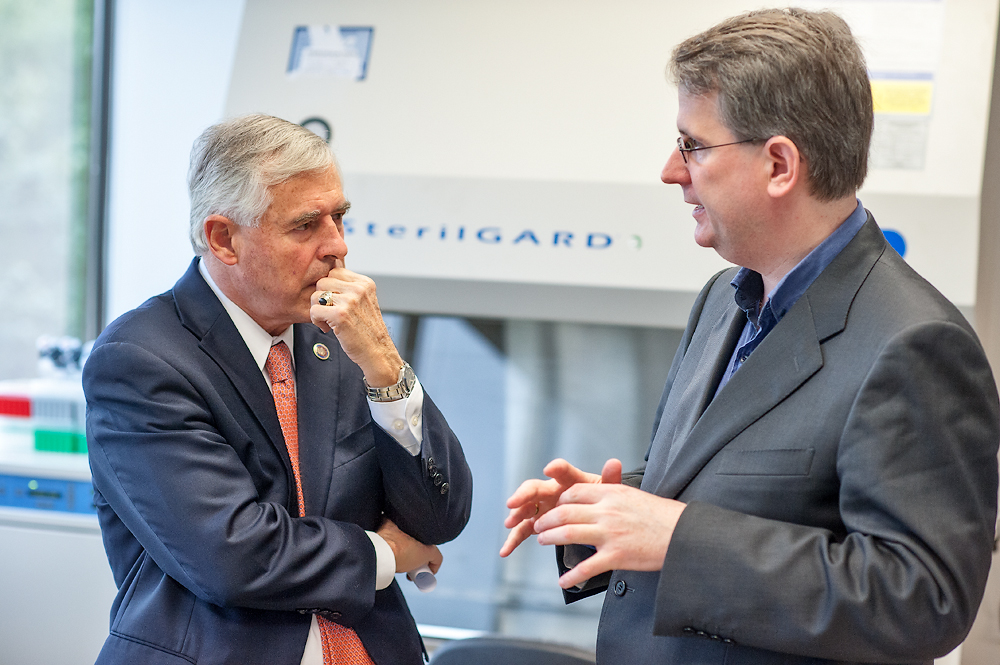Senator Edwards Visits BioTherapeutics

BLACKSBURG, VA., October 17, 2016—Senator John Edwards visited BioTherapeutics Inc. (BTI) on Thursday October 6, 2016 to tour their facility at the VT Corporate Research Center and learn more about the important work they are conducting.
“The various projects at BTI will continue to bring new biotech jobs to Montgomery County” Edwards said. “I was impressed by the substantial progress that the company has made in new product development. BTI’s innovative technologies help develop safer and more effective therapies for Crohn’s disease and represent a huge potential for the region and we should capitalize that. My office will continue to help bring new, good paying jobs to Virginia and drive innovation through the BioHealth Capital Region.”
Edwards received a firsthand look at the technology developed by BTI, which uses funding from the National Institutes of Health and the Virginia Bioscience Health Research Corporation (VBHRC). During his tour of the BTI Laboratory, Senator Edwards met with Dr. Josep Bassaganya-Riera, President and CEO to discuss the current progress and future plans for developing new oral therapeutics for Crohn’s disease and ulcerative colitis, which are the two clinical forms of inflammatory bowel disease (IBD). Although there is a genetic predisposition to developing IBD, there is no known cause or cure. Treatment requires lifelong medical care for many patients and involves the suppression of the body’s excessive inflammatory response.
“There is an unmet clinical need for safer and more effective therapeutics for IBD,” said Dr. Josep Bassaganya-Riera, “The core technology being developed by BTI is a new mechanism of action implicated in suppressing inflammation during IBD. BTI’s clinical lead, BT-11, is an orally acting therapeutic that acts locally in the gut to treat IBD. In terms of efficacy and safety, it outperforms drugs currently in the market as well as investigational new drugs (INDs). ”
BTI is advancing BT-11—an oral, locally acting small molecule therapeutic that binds to Lanthionine Synthetase C-like 2 (LANCL2) and exerts potent anti-inflammatory effects in the gut—toward an IND filing and Phase I human clinical testing in 2017.
“With a world-class Scientific Advisory Board, with expertise in IBD and ready to execute on our clinical plan, BTI is finalizing chemistry, manufacturing and controls and toxicology studies required for IND approval of BT-11,” said Dr. Carbo, BTI’s Chief Operating Officer. “Based on a preIND meeting with the Food and Drug Administration, the path from IND to Phase I-III clinical studies is clear. BTI anticipates initiating Phase I clinical trials in normal healthy volunteers in 2017 and completing Phase II trials in Crohn’s disease patients by 2018. BTI has created significant momentum around BT-11 and the LANCL2 pathway and the visit of Senator Edwards further validates the disruptive potential of the LANCL2 technology and BT-11, plus BTI’s unwavering commitment to create new Biotech jobs in Southwest Virginia through development of these therapeutics.”
BTI’s internationally recognized Scientific Advisory Board is composed of several prominent key opinion leaders (KOLs) in gastroenterology and IBD, including: Drs. Jean-Frederic Colombel (Director of the IBD Center at Mount Sinai School of Medicine), Fabio Cominelli (Director of the Digestive Health Research Institute at Case Western Reserve School of Medicine), William Sandborn (Chief, Division of Gastroenterology at University of California San Diego), and Francisco Sylvester (a pediatric gastroenterologist at University of North Carolina at Chapel Hill and Member of the Board of Trustees of the Crohn’s and Colitis Foundation of America).
The Landos (for LANCL2 technology) program at BTI develops first-in-class oral therapeutics for IBD. BTI’s multifaceted approach synergistically combines the power of computational modeling with preclinical and clinical experimentation to accelerate the path to safer and more effective treatments for debilitating and widespread human diseases.
